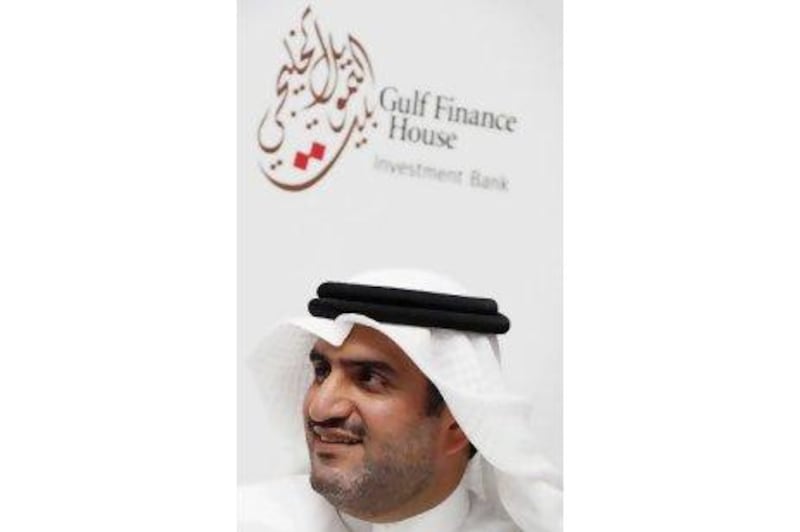Shareholders of Gulf Finance House (GFH), an investment bank in Bahrain, have approved a plan to raise up to $500 million to rescue the company from the brink of bankruptcy and finance a wholesale rethinking of its business model.
Despite objections from some investors, holders of about 32 per cent of GFH stock gave the nod to all items on the agenda at a pair of meetings on Sunday, according to a statement posted on the Bahrain Stock Exchange website.
Those included bringing in fresh funds through an Islamic financing instrument convertible into shares, as well as a reduction in capital and a four-to-one consolidation of shares.
They also agreed to an asset swap between GFH and its chairman, Esam Janahi, under which Mr Janahi is to transfer his entire 10 per cent stake in Khaleeji Commercial Bank to GFH in return for 100 per cent of Al Areen Leisure and Tourism plus $3m in cash or GFH shares.
The transfer would raise GFH's stake in Khaleeji to 47 per cent, or nearly a controlling interest.
"There were objections on the part of shareholders regarding some items" on the agenda, the GFH statement said, without elaborating on which ones investors were concerned about. The company said it would "gauge the impact these objections will have on the final adoption of the items".
Company executives could not be reached for comment yesterday, and GFH's offices were closed for the Eid holidays.
GFH originally called the ordinary and extraordinary general meetings at the end of last month. The company postponed them twice because not enough shareholders showed up.
Raising new money is considered a necessity for GFH as it tries to delay repayment of hundreds of millions of dollars of debt and radically reconfigures a business model that the company recently acknowledged in a presentation to investors was "not sustainable in the current financial climate".
GFH's problems mirror those at investment companies across the region. Many of them made money by taking large up-front premiums on investments in mammoth property developments and private equity funds. But as with many of its peers, GFH's revenues all but disappeared when investors pulled back in the wake of the financial crisis, leaving it with huge debts and little cash to forge ahead with projects it launched during the boom.
Those projects included commercial and industrial developments in Qatar, Jordan, Tunisia and India collectively worth several billion dollars.
"For years GFH relied simply on overcharging investors for investments and pocketing the difference as its revenue, but neglected to create businesses that had steady income," John Sandwick, an Islamic asset management expert, said after GFH announced plans to raise new money last month. "GFH hopes new capital now will be enough to pay its operating costs until new business lines can become profitable. But whether those new businesses will find customers is a big question."
GFH lost $728m last year. It has posted additional losses of $162.8m this year, including $115.12m in the third quarter.
The new plan is for GFH to be an incubator of Islamic financial institutions across the Middle East. It will gradually exit its property portfolio and focus on lines of business with stable, recurring revenues this year and next, according to a shareholder presentation.
By 2012, the company expects to look for new investments in Saudi Arabia, the Levant, Africa, India and Malta. Between 2013 and 2015, the hope is to return to profitability while fully getting out of legacy projects and investments.
GFH has already raised $80m from asset sales this year, well short of the $250m its chief executive, Ted Pretty, said he envisaged in February. The company ultimately plans to raise an additional $450m from asset sales in the next four years.
Along with the $500m to come from investors, that money will help fund GFH's new business model and repay about $190m of debt.
afitch@thenational.ae





